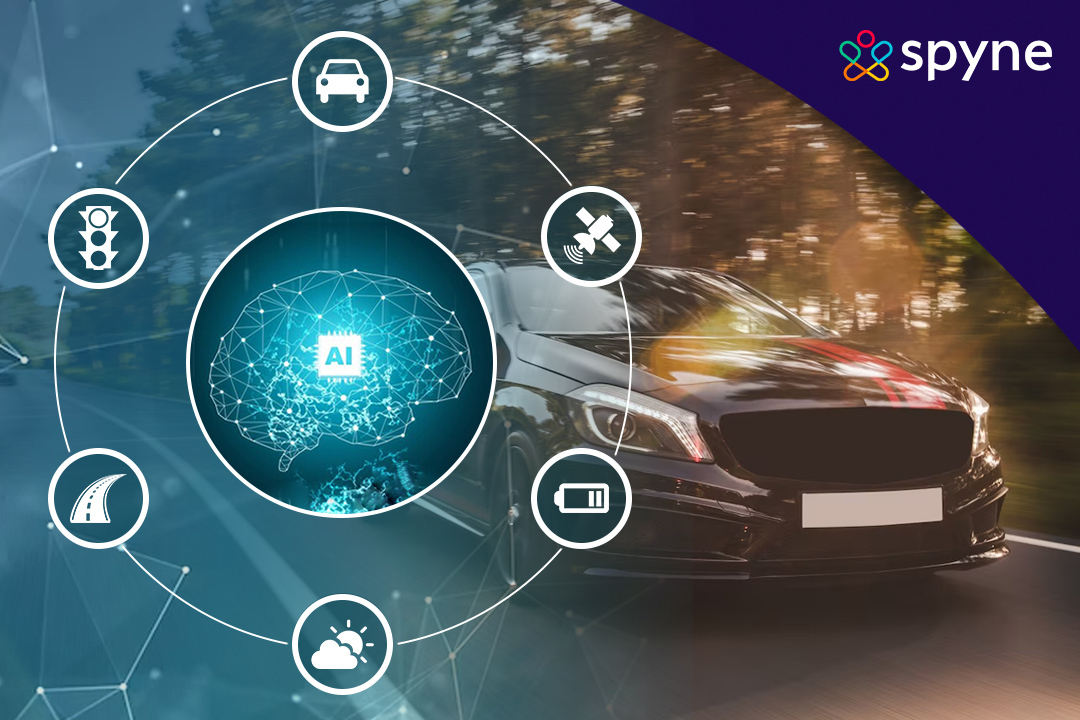As the world slowly becomes more tech-savvy, the global market sees the emergence of artificial intelligence. AI is influencing many business sectors through its technological advancement. The automotive industry is also opening its doors to AI, and many big manufacturing companies are welcoming the application of AI in automobiles. Companies in automotive are using AI to get a competitive advantage by giving customers a more enhanced and personalized experience. AI improves safety through (ADAS) advanced driver assistance systems that include autonomous emergency braking, lane departure warnings, and adaptive cruise control. Therefore, it helps to prevent accidents by alerting drivers to take preventive actions from potential hazards.
AI in automotive industry has brought technological advancements in car manufacturing and automotive retailing. This article will explore how much change AI brings to the auto industry. Did you find it interesting? Then this article is for you.
AI in Automotive Industry – Overview
AI in automotive industry has been hugely influential in the market. Artificial Intelligence means a machine’s or computer’s ability to do tasks like learning, designing, and decision-making without human intervention. Many companies in different industries must know how AI could provide innovations. But with time, AI started to become a pillar of reaching new levels of innovation. AI has significantly changed the global market by enhancing the supply chain, reducing costs, and optimizing manufacturing. Therefore, AI now has a more significant role in providing innovation in the automotive industry.
AI use in automotive industry improves safety through advanced (ADAS) advanced driver assistance systems like adaptive cruise control, autonomous emergency braking, and lane departure warnings that help prevent accidents by alerting drivers and making them take preventive actions. AI in the auto industry has brought changes and significant innovations in automobiles. Various technologies, such as machine learning, computer vision, and robotics, have helped manufacturers build technologically advanced vehicles. Thus, AI has simplified and provided manufacturers with new automotive solutions.
How AI Works in Automotive?
AI-enabled systems use sensors to assist with pedestrian detection and steering to alert the driver and monitor blind spots. Therefore, it allows drivers to take preventive actions to avoid road accidents. Additionally, there are five levels of vehicle automation. ADAS is one of the broadest applications of AI in automotive industry. As per the World Health Organization (WHO), machine learning for automotive industry developments helps enhance road safety and reduce human error. Additionally, most traffic accidents worldwide are caused by human error.
AI in cars is between levels 1 and 3. To achieve full autonomy, a vehicle needs extensive ML model training, during which the machine drives and the driver becomes a passenger. The car must also handle more than 1 TB of data per second. The data is sent to cloud platforms, which are processed, annotated, and used to improve these algorithms. However, this approach is incompatible with the demand for low energy consumption.
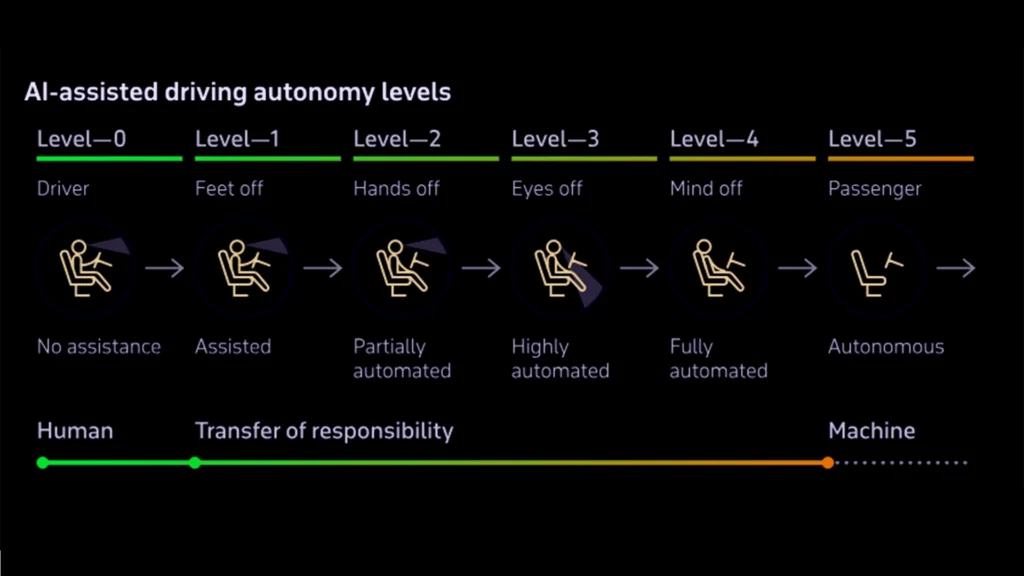
Additionally, some economic challenges exist due to the widespread global adoption of autonomous vehicles. Autonomous vehicles are successful at some level. However, they learn only one route. This allows the AI system to create a very detailed road map. However, it is not helpful for larger-scale autonomous cars because mapping every route in one area is impossible.
AI algorithms
The three standard algorithms of artificial intelligence in automobile industry and autonomous vehicles combine cluster, regression, and decision matrix. We have mentioned how these algorithms work.
1) Regression Algorithms: Regression algorithms predict the outcome of various situations found in historical data. They indicate that an obstacle will appear on the road or the pedestrian will cross the car’s path. These algorithms process and collect the data during each trip. It helps to improve their decision-making skills over time.
2) Cluster Algorithms: Cluster algorithms process and make sense of vast data streams from numerous sources, such as cameras, sensors, and GPS systems. These algorithms enable the car to classify and recognize objects on the road and react accordingly. They also assist navigation and route planning, continuously improving and adjusting routes based on real-time traffic situations.
3) Decision Matrix Algorithms: Decision matrix algorithms help make choices, including outcomes and predefined rules coded into the algorithm. They can also consider real-time data from the car’s sensors. These algorithms decide the vehicle’s upcoming action, such as where it should go or take a turn. The success of these actions depends on the algorithm’s ability to ideally recognize, identify, and anticipate an object’s next movement.
Impact of AI in Automotive Industry
AI used in automotive industry has revolutionized traditional practices by optimizing manufacturing processes, enhancing the supply chain, and reducing costs. Data from vehicles and sales can help model and regulate the production process with real-time data. Additionally, AI in automobile industry helps to streamline manufacturing processes, reduce costs, and improve supply chain management. AI is revolutionizing the automotive industry, making it safer, more intelligent, efficient, and greener.
1) Dealership Services
Car dealerships were old-fashioned during the traditional days of the automotive industry. The negotiation was done when the dealer and customer met, and the dealer physically showed the car. But now retailing has taken the following steps with AI, with the help of machine learning in automotive industry and automotive chatbots. This allows 24/7 service to customers by providing specific information the interested buyer requires. AI in automobile industry has also made an inspection of car digital and virtual with the help of virtual car studios.
2) Manufacturing Process
Before artificial intelligence in car manufacturing, automobile manufacturing depended on a manual workforce. The process was time-consuming, and the cost of production was high. The challenge at the time was collecting data on the performance of manufactured cars. It was also difficult to detect faults or errors. But now, AI in automobiles has allowed manufacturers to automate the process through robotics and collect real-time data through AI software.
3) Revolutionizing Dealership Marketing
AI has revolutionized how auto dealerships market their cars. It allows them to predict customer preferences and tailor their marketing strategy accordingly. Dealerships can create targeted marketing campaigns with AI-powered tools based on customer’s data including their online behavior and past purchases. It will help businesses to improve their conversion rate and enhance customer engagement. Dealerships can also optimize their inventory based on market demand, stock vehicles, and predictive trends.
4) Enhanced Experience
Many automotive companies have now added AI technology to their cars, which helps provide customers or drivers with a better experience. AI now offers real-time monitoring systems that were not available before. But now, the AI automobile industry has advanced a lot, and companies are finding different ways to add additional features to their manufactured cars. Now, AI in automobiles can monitor and detect if there is any damage to vehicles. These features are now standard in growing automotive industry trends.
How is AI Transforming the Future of the Automobile Industry?
The automotive industry is one of the most prominent investors in AI and is driving a profound transformation in its future. Automotive industry players are using the power of machine learning algorithms to refine the quality of data crucial for autonomous driving systems. This ensures that self-driving vehicles can operate with greater precision and safety.
AI is helping automotive industry in opening new doors with its machine learning and automation. The automotive industry is slowly leaning towards being eco-friendly, and with the help of AI technology, companies are manufacturing electric cars. AI for automotive industry is transforming the future of the automotive industry, and these current AI trends will be prominent in the future of automotive industry and will showcase on what scale it is changing.
Furthermore, AI is pivotal in enhancing driver convenience and safety. Features like automatic braking and blind-spot detection, which AI empowers, are becoming commonplace. These advancements make driving more convenient and significantly reduce the risk of accidents. As the use of AI in automobile industry continues to evolve, it promises a future of AI cars where automobiles are brighter, safer, and more efficient.
1) 5G is the New Partner For AI
5G is one of the newest innovations on the internet. The connectivity that 5G promises can help the automation in the automotive industry manufacture cars that will help build a digital bridge. While commuting, 5G can connect devices and people. With the combination of AI, the Internet can provide a better driving experience to customers. Our entertainment system can become a proper informant system working on drivers’ commands. Instead of just using the car system for listening to music or taking hands-free calls, a driver can get more technical information about how a car performs and how much oil is left with just his or her voice.
2) AI in Automotive Operations
AI in automotive industry can provide automated changes to the manufacturing process. It can impact the sales and selling process by providing the salesperson with data like customers’ journeys of potential clients. This will help salespeople optimize their overall sales process and conversation. Conversion rates and costs can be reduced if properly integrated into the operations.
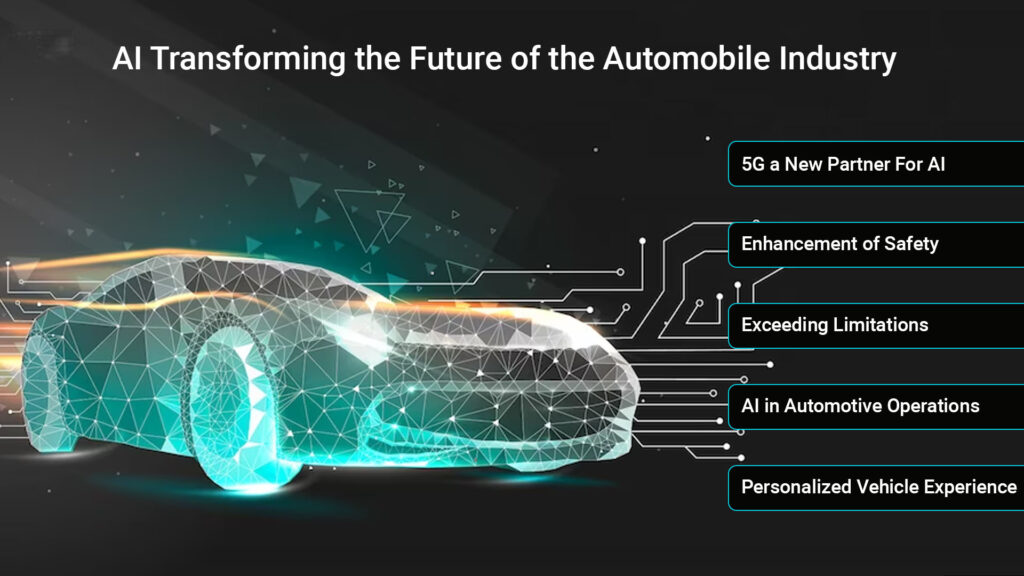
3) Enhancement of Safety
Road trips and commutes are filled with road hazards and potential threats. AI’s advanced machine learning system helps companies in the automotive industry build cars that can detect traffic behavior. This can help drivers predict potential danger and guide them to safety.
4) Personalized Vehicle Experience
Driving a car can be a way of self-expression. AI in automobiles, with its capabilities, can provide something similar, and many big automotive companies like Porsche are giving something called a “Recommendation Engine.” This machine learning can suggest vehicle packages according to individual drivers’ preferences.
5) Exceeding Limitations
Companies recognize that AI can bring significant, innovative changes to their automotive industry. Many designs, body parts, and engines have been developed using different suggestions from artificial intelligence systems. AI in car manufacturing has brought new ways that were not expected to be found in the past. The possibilities that what automotive industries think is their limit right now will be exceeded through AI in the future.
12 AI Use Cases in Automotive Industry
Artificial Intelligence (AI) has transformed the automotive industry, enhancing safety, efficiency, and the overall driving experience. Here is the use of AI in automotive industry sector, including the mentioned driver assistance:
1) Driver Assistance
- One of the best uses of AI in the automotive industry is advanced driver assistance systems (ADAS). AI-enabled systems employ sensors to help with steering and pedestrian identification, monitor blind spots, and inform the driver as necessary, allowing them to take preventative action to stay safe from traffic incidents.
2) Autonomous Vehicles
- Self-Driving Cars: AI is at the core of autonomous vehicles, enabling them to perceive their surroundings, make decisions, and navigate without human intervention. Companies like Tesla and Waymo use AI in the automobile industry to develop self-driving technology.
3) Driver Monitoring
- In-Cabin Monitoring: AI systems equipped with cameras and sensors can monitor driver behavior, including drowsiness detection, distraction alerts, and even assessing the driver’s physical condition and display this through automotive software.
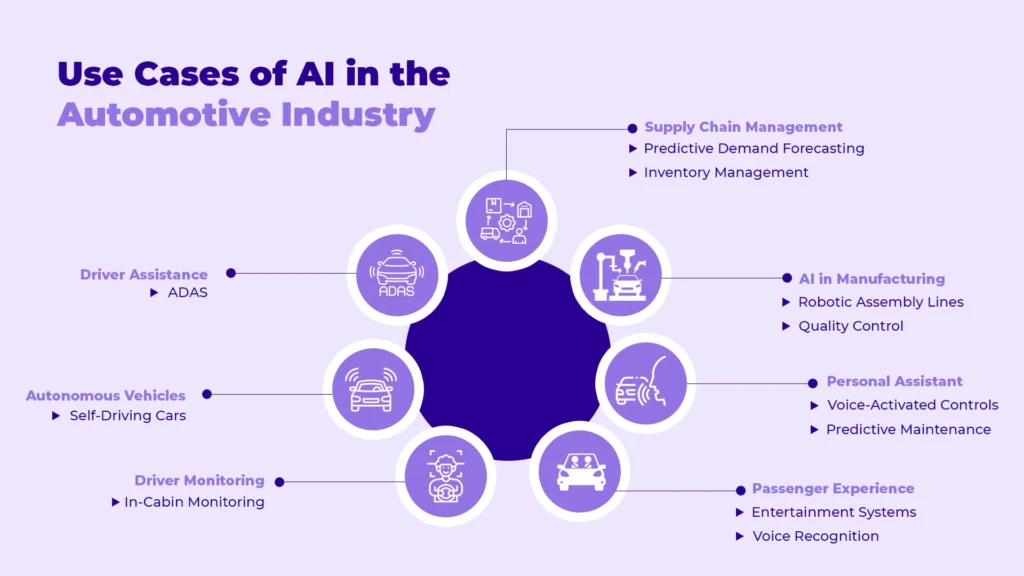
4) AI in Manufacturing
- Robotic Assembly Lines: In automotive manufacturing, AI-driven robots and automation systems help with welding, painting, and assembly, increasing precision and efficiency.
- Quality Control: AI inspects and identifies vehicle defects during the production process, reducing errors and ensuring higher product quality.
5) Personal Assistant
- Voice-Activated Controls: Many modern cars feature AI-powered virtual assistants (e.g., Siri, Google Assistant) that enable hands-free control of navigation, music, and other functions.
- Predictive Maintenance: AI can predict when vehicle components will likely fail, helping drivers schedule maintenance and avoid unexpected breakdowns.
6) Passenger Experience
- Entertainment Systems: AI enhances the in-car entertainment experience, providing personalized content recommendations and improving infotainment systems.
- Voice Recognition: Passengers can interact with the vehicle’s systems through voice commands, making it easier to control various functions.
7) Supply Chain Management
- Predictive Demand Forecasting: AI analyzes data to predict demand for specific vehicle models, allowing automakers to optimize production and reduce inventory costs.
- Inventory Management: AI assists in managing inventory levels and streamlining the supply chain to ensure the timely delivery of parts and components.
8) AI-driven Marketing for Dealerships
- Customer Segmentation and Targeting: Car dealership marketing can run customized promotions for target-specific groups based on customer engagement history, purchasing behavior, and demographic data.
- Predictive Analytics for Lead Scoring: Employing predictive analytics allows dealerships to score leads based on prioritizing efforts on prospects with the highest potential to convert into sales.
- Chatbots for Customer Engagement: AI-powered chatbots enhance customer engagement and service by providing them with instant communication, scheduling test drives, answering queries, and facilitating initial sales discussions.
9) Quality Control
- Detect Defects: AI allows auto manufacturers to to detect the minutest defects in the cars at an early stage which can be resolved on a priority basis. AI systems also allow manufacturers to locate the defective parts that need to be replaced and parts that require urgent maintenance.
10) AI in Designing
- AI allows auto architects and manufacturers to perform real-time tracking and programmable shading to complete the car design process swiftly. AI helps car designers generate numerous designs for better workflow and product ideas for autonomous vehicles.
11) Connected Cars
- The rapid expansion of IoT in AI systems allows vehicles, smartwatches, smartphones, and infrastructure to connect seamlessly, enhancing the safety and experience of self-driving cars and improving automotive system integration. For example, connected cars can share information with one another, ensuring a safe distance is maintained. Additionally, these vehicles provide traffic managers with a clearer view of road conditions, helping them manage traffic flow more effectively.
12) Automotive Insurance
- AI in automotive insurance offers significant advantages for both insurers and drivers. AI-powered algorithms streamline the claims process after an accident, making it quicker and more efficient. Features like object detection and image analysis allow drivers to easily gather incident data and submit claims. For insurers, AI helps analyze vehicle damage accurately and process images, reducing errors and speeding up claim approvals.
AI has become an integral part of the automotive industry, impacting various aspects, from safety and manufacturing to the driving experience and supply chain management. The development of self-driving cars and the widespread adoption of driver assistance systems are notable advancements contributing to safer and more efficient transportation.
What is the Future of AI in Automotive Industry?
We will witness a staggering (CARG) compound annual growth rate of 55% from the year 2024 – to 2024. Additionally, the automotive industry in 2024 is facing some challenges, like supply chain disruptions and high interest rates. However, it settled into a positive trend in 2024. The industry is prepared to adapt to changes in car buyers’ preferences, and the outlook for sales is upbeat. We have mentioned a few artificial intelligence cars’ future prospects for automotive companies in 2024 below:
Future Prospects for Automotive Companies
1) Integration of OEM-based AI chips: Automotive manufacturers are likely to embed OEM-based AI chip designs to enhance car functionalities, including cruise control, lighting systems, and autonomous driving capabilities.
2) Market Value and Software Integration: The AI market will reach a valuation of $200 billion within the next decade because of the seamless integration of software in the auto system.
3) Autonomous Vehicle Segment Expansion: Autonomous vehicle segment value will rise to $30 million by 2024. Additionally, per consumer, there is an increasing demand for autonomous vehicles. The autonomous vehicles market share is forecasted to expand by 10.9%, with an anticipated 99,451 million units by 2032.
4) Growth in ADAS: The ADAS market will grow significantly at 9.6% annually, with an expected market valuation of $131 billion. This significant growth reflects the increased adoption of advanced vehicle safety features.
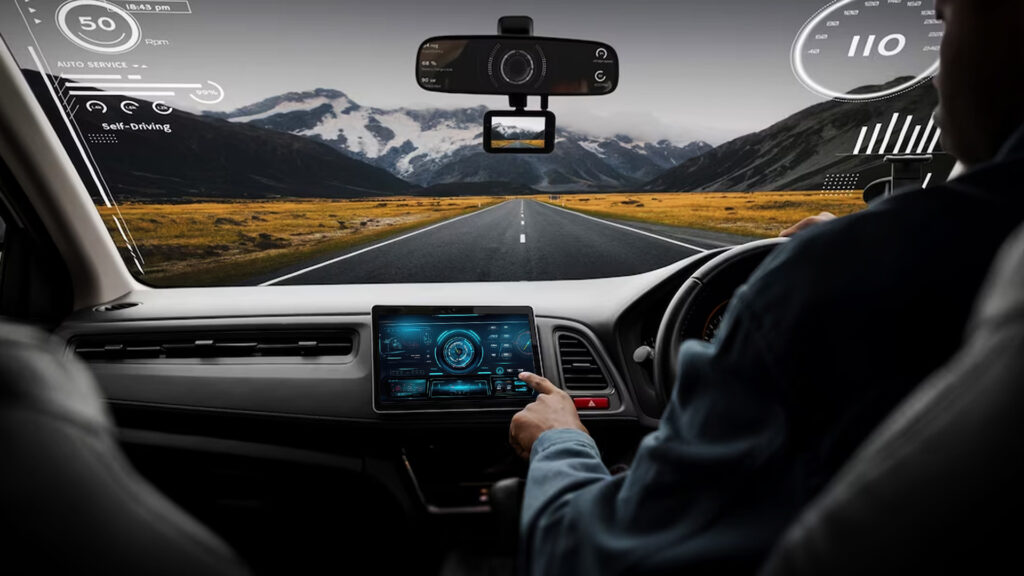
5) Automotive AI Market Expansion: The automotive AI companies market has grown at a CAGR of 39.8% since 2019. It is forecasted to reach $15.9 billion before 2027. Therefore, this indicates a robust investment and growth in AI technology in automotive industry.
6) Generative Artificial Intelligence in Cars: As per MarketReseach.biz, the application of generative AI in the auto sector is expected to rise by $2.1 billion by 2032 from $271 million in 2022. This growth signifies the expansion of generative AI in vehicle efficiency and driving innovations in manufacturing and automotive design.
These insights showcase that AI plays a central role in shaping and revolutionizing the future of the automotive industry including manufacturing processes and enhancing vehicle safety and functionality, leading to promising growth and innovation in the industry’s evolution.
What is the Future of CDPs in the Automotive Industry?
The future of Customer Data Platform’s (CDPs) role is becoming increasingly efficient as the automotive industry evolves under AI influence. CDPs combine data from multiple sources into a single comprehensive database. Further, they are set to revolutionize how auto companies interact with their clients.
1) Enhanced Customer Insights & Personalization
CDPs offer unparalleled levels of customer engagement and personalization. Auto brands can achieve a deeper insight into customer behavior, needs, and preferences. CDPs enable auto businesses to enhance customer journeys, tailor car recommendations, and deliver personalized marketing messages. Therefore, this insight ensures that car buyers receive communication and offers that are relevant to their preferences and needs, boosting loyalty and satisfaction.
2) Streamline Operations and Increasing Efficiency
CDPs streamline the operations from supply chain management to post-sales support. It helps auto businesses to predict market trends, optimize their inventory, and improve their sales process efficiency. Therefore, customer data across enterprise integration allows a more cohesive customer experience & more agile decision-making.
3) Driving Innovation in Product Development
The collected information from CDPs is instrumental in innovation and driving product development within the auto industry. Auto manufacturers can design and develop cars according to current market demands including technologies, features, and designs that align with clients’ expectations after understanding their behavior and preferences. Additionally, this customer-centric approach ensures that businesses remain relevant and competitive in a rapidly changing market.
Top Benefits of AI in Automotive Industry
Automobile AI can provide many benefits if appropriately integrated into the automotive industry. AI can create new opportunities and possibilities, and creating new ways to benefit can bring new benefits to the surface.
1) Improved Safety: AI systems like lane departure warnings, autonomous emergency braking, and adaptive cruise control enhance road safety by alerting drivers to potential hazards and taking preventive actions, reducing accidents.
2) Predictive Maintenance: Through IoT, AI enables predictive maintenance by continuously monitoring vehicle data and alerting managers to potential issues before they become major problems, improving vehicle performance and reducing maintenance costs.
3) Enhanced Driver Experience: AI-powered infotainment systems provide personalized experiences for passengers and drivers, offering smart voice assistants that understand regional languages, play music, guide routes, and adjust vehicle settings, making journeys safer and more enjoyable.
4) Autonomous Driving: AI-driven autonomous vehicles have the potential to revolutionize the automotive industry by reducing accidents, increasing mobility, and improving traffic flow, especially for individuals with mobility challenges.
5) Cost Savings: Artificial intelligence in automotive industry optimizes manufacturing processes, improves supply chains, and identifies potential vehicle issues, resulting in cost reductions in various aspects of operations, from design to manufacturing.
6) Targeted Marketing Strategies: Auto dealerships and manufacturers can implement tailored & targeted marketing strategies by analyzing customer behavior and data through automotive digital marketing. They can run tailored offers and marketing messages as per customers’ preferences and needs to increase conversion rates and engagement.
7) Optimized CDPs: Auto businesses can be empowered when integrating Customer Data Platforms (CDPSs) with AI technologies in cars. It will allow them to deliver effective engagement strategies, and personalized customer experience, and improve customer loyalty.
AI’s advancements have significantly contributed to the automotive industry’s growth, transforming how we interact with and drive vehicles.
Top 4 Automotive Companies Leveraging AI Solutions
AI is transforming the automotive industry, with leading companies using cutting-edge technology to enhance vehicle performance, safety, and user experience. From autonomous driving to in-car assistants, AI is revolutionizing how cars are developed and driven. Let’s explore how the top 4 companies are utilizing AI:
1) BMW
BMW utilizes around 400 AI applications throughout its operations, ranging from vehicle development and energy management to in-car personal assistants and automated driving technologies.
2) Nvidia
Nvidia is a top provider of AI-based solutions for autonomous vehicles, helping process large amounts of sensor data. This allows automakers to develop new cars and implement driver monitoring systems.
3) Tesla
Tesla, the leading electric vehicle manufacturer, incorporates AI to support self-driving capabilities in its cars, enhancing the autonomous driving experience.
4) Waymo
Waymo, a prominent autonomous driving technology company, uses AI to power self-driving capabilities in its delivery vans, taxis, and tractor-trailers.
Ethical Considerations & Challenges of AI in Automotive Industry
It is a fact that there are numerous advantages to the utilization of AI in the automotive space but there are also a few challenges and ethical considerations that you should keep in mind. These considerations and challenges are summed up below:
Data Privacy: AI in vehicles collects vast amounts of data, including driver behavior and location information. Protecting this data is essential to maintaining consumer trust.
Regulation: Strong regulatory frameworks are crucial for the safe development and deployment of autonomous vehicles. Governments worldwide are working on legislation to ensure AI’s responsible use in transportation.
Job Displacement: As autonomous vehicles become more widespread, industries like trucking and delivery could see job losses. Preparing the workforce for these changes is a significant challenge.
Ethical Dilemmas: Self-driving cars may face difficult ethical decisions, especially in situations where human lives are at risk. Determining how these vehicles should act in such scenarios remains a critical issue.
AI in Cars: Notable Examples of AI in the Automotive Industry
Artificial intelligence is reshaping the automotive industry, from autonomous driving to advanced manufacturing processes. Leading automotive software companies are leveraging AI to enhance vehicle design, driver assistance, and even last-mile delivery services. In this post, we’ll explore top examples of AI applications in cars, showcasing how this technology is driving innovation across the industry. Here are some ai in automotive industry examples:
Examples of AI Applications in Autonomous Vehicles
Whether it’s for public transportation, ride-sharing, or personal use, the following companies are leading the way in autonomous vehicle technology:
1) Zoox
Zoox is using AI in Autonomous Vehicles by building its own autonomous vehicles instead of outfitting existing vehicles with self-driving technologies. It is primarily functioning as a replacement to Lyft and Uber by providing robotic rideshare vehicles.
You can summon a Zoox vehicle using their app on your smartphone. Zoox conducted its first robotaxi ride on a public road with passengers on board in 2023. Zoox is currently located in Foster City, California
2) AutoX
AutoX is using AI to produce autonomous vehicles that are retail based. These vehicles would be a part of fleets that are intended to function as robotaxis and driverless delivery service providers.
It combines multiple sensors, real-time cameras and tests them for thousands of miles virtually as well as in the real world to ensure safe decision-making on the road. AutoX has deployed its robotaxis in China and has recently received a permit to launch its robotaxi program in California. It is currently based in San Jose, California.
Examples of AI Applications in Auto Manufacturing
These examples highlight how AI-driven systems and smart machinery are enhancing efficiency on automotive production lines:
1) Rockwell Automation
Rockwell Automation is using AI to infuse its manufacturing bots with artificial intelligence to make them better at assisting the car production process. With the help of AI, these robots gain the ability to install convoluted parts, apply paint as well as assemble cars fully. Rockwell Automation also provides AI-powered solutions for manufacturing EVs and tires. It is currently located in Milwaukee, Wisconsin.
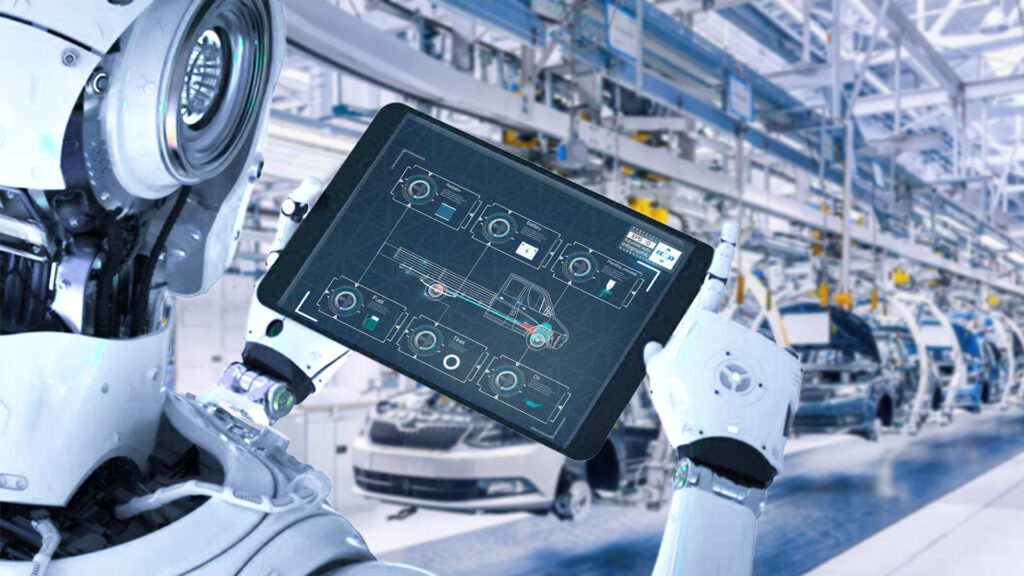
2) ABB
ABB is using AI to offer a host of robotic AI products across different industries but its manufacturing robots need a special mention as an example of AI in automotive industry. ABB’s ‘cobots’ not only inspect vehicle parts and paint amongst other things but they do so alongside humans. These cobots can sense when people and objects are nearby and stop moving to avoid bumping into them. They do this with the help of AI technology. ABB is fully remote.
Examples of AI Applications for Driver Assistance
Here’s how several companies are utilizing AI in cars to develop driver-assist technologies that improve road safety:
1) Nauto
Nauto’s uses AI to build sensor technology that is powered by AI for use in commercial fleets. Its intelligent driver system prevents distracted driving by assessing driver behavior and reducing potential collisions. Nauto uses data to avoid collisions and traffic violations by keeping drivers fairly attentive. It is currently located in Palo Alto, California.
2) CarVi
CarVi uses AI to produce ADAS systems that can be utilized by personal vehicles, ride-sharing companies and fleets. It uses AI to provide real-time alerts and a detailed driving analysis to warn drivers of potentially erroneous maneuvers such as poor driving conditions, forward collisions or lane departure. Furthermore, it uses a scoring system to rate driving skills and helps drivers improve their poor driving habits. It is currently located in San Francisco, California.
Examples of AI Applications for Autonomous Delivery
The role of AI in automotive industry in the development of self-driving vehicles for delivery services. Below are some examples of AI-powered autonomous delivery solutions:
1) Starship Technologies
Starship Technologies is using AI to create delivery robots that are self-driving. These robots operate at pedestrian speeds as they navigate around hurdles to deliver packages, meals, and groceries to customers. These orders can be made through the Starship app. These robots weigh less than 100 pounds and make use of a locked cargo bay that only opens when it reaches the desired customer who can open it using the app. Starship Technologies is currently located in San Francisco, California.
2) Kiwibot
Kiwibot is using AI to develop a last mile delivery network that will utilize a fleet of around 500 all electric AI robots. These robots have been deployed throughout the United States in 26 campuses. Users can place orders with restaurants through an app and then track their robotic delivery in real-time.
AI Applications in Car Design
AI is revolutionizing the way cars are designed, particularly by using data from CAD and CAE tools. One key area of focus is aerodynamics, which directly influences fuel efficiency, handling, and comfort. Here, we’ll explore three crucial elements where AI can make a difference: drag, downforce, and noise.
Passenger Car Aerodynamics
When designing a car’s aerodynamics, several factors come into play, many of which can be simulated with AI or CFD (Computational Fluid Dynamics). Three key areas that impact aerodynamics are the following:
Drag: Lowering drag improves fuel efficiency and top speed. Traditional methods include streamlining the shape or adding devices like spoilers.
Downforce: Increasing downforce improves handling and stability, especially at high speeds.
Noise: Both internal and external noise, often caused by airflow around the car, can be reduced with smart aerodynamic design.
While optimizing these aspects is crucial, CFD simulations often require specialized skills and resources which limit their accessibility.
AI Applications in Automotive Industry Value Chain
By leveraging AI in automotive industry, car companies can improve their driving experience, safety, and efficiency. Artificial Intelligence stands out across all stages of the value chain in the automotive industry.
1) Manufacturing: Artificial Intelligence is critical in optimizing and innovating the modern vehicle industry. It enables innovative car designs, better supply chain management, and more efficient car assembly with exoskeletons and robots.
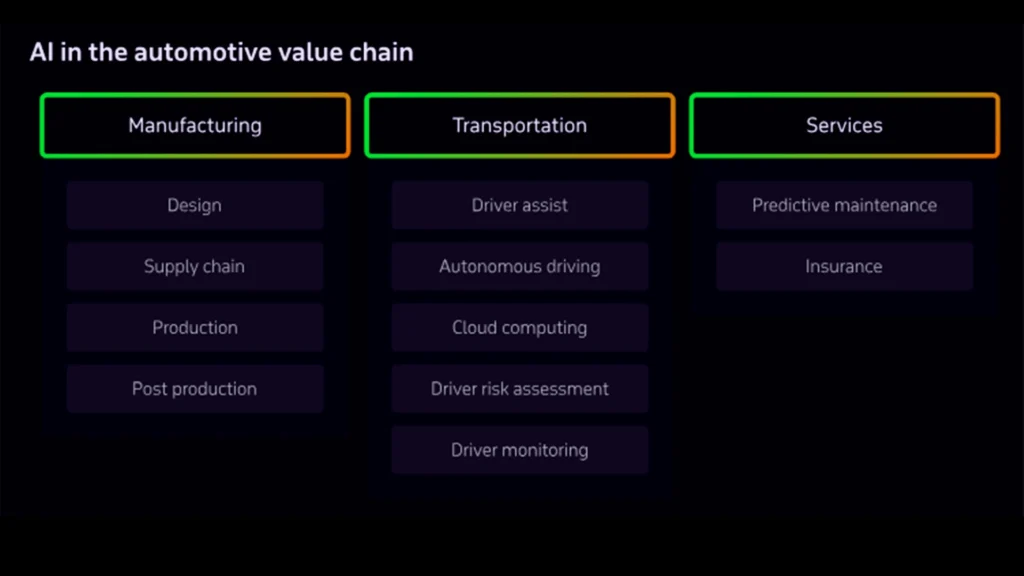
2) Transportation: Artificial intelligence is essential in driver assistance technology. It enables drivers to recognize their fatigue levels, navigate highways, and detect critical defects in the vehicle. Additionally, it increases the safety of driving and reduces stress.
3) Service: Artificial Intelligence enhances vehicle performance and efficiency using IoT sensors to monitor battery usage and engine health. AI offers better insurance solutions, such as fairer and faster claims processing.
Embrace the Power of AI in Your Automotive Business with Spyne
Spyne harnesses the power of AI to deliver advanced solutions and tools for your automotive business. Its AI-powered tools, such as Image Studio, 360 Spin, and Video Tour, help capture high-quality images and videos of your vehicles and improve your merchandising process. Spyne also offers an AI-powered Website Builder that can create your ideal website in minutes. This Website Builder includes real-time analytics to help you track and manage your data. With this impressive portfolio of AI-powered products, Spyne is leading the way in AI innovation within the automotive industry.
Conclusion
AI in automotive industry is bringing fresh air into the car industry. New technologies built with AI are allowing manufacturers to go beyond and above. With AI, the only limitation is imagination and creativity. However, challenges like safety concerns and regulatory complexities must be addressed. Despite these hurdles, AI is steering the automotive industry towards a future where vehicles are safer, more efficient, and deeply personalized, redefining how we drive and interact with our cars.

